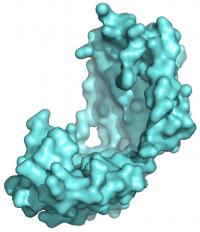Feb 19 2011
A research team led by James Bardwell, professor of molecular, cellular and developmental biology and biological chemistry at the University of Michigan, and a Howard Hughes Medical Institute investigator, constrained bacteria into making big volumes of stable, functional proteins, in the process discovering the molecular helper named Spy.
 UMich's Spy Biosensor
UMich's Spy Biosensor
The report has been published in the February13 issue of Nature Structural & Molecular Biology.
The team developed biosensors to connect protein stability to the antibiotic resistance of bacteria. When a weak protein is place in the center of the biosensor in a bacterium, it interrupts the bug’s resistance to antibiotics. When the protein is strengthened, resistance is renewed. The team inserted a weak protein into Escherichia coli to compel the bacteria to enhance protein stability or die in the presence of antibiotics. Groups of bacteria displaying increasing antibiotic resistance were chosen to develop bacteria that produced stable protein. It was found that a small microbe called Spy was strengthening the weak bacteria.
The research was conducted at the university laboratory where post graduate students also participated. The work was financed by the Howard Hughes Medical Institute and the Canadian Institutes of Health Research.